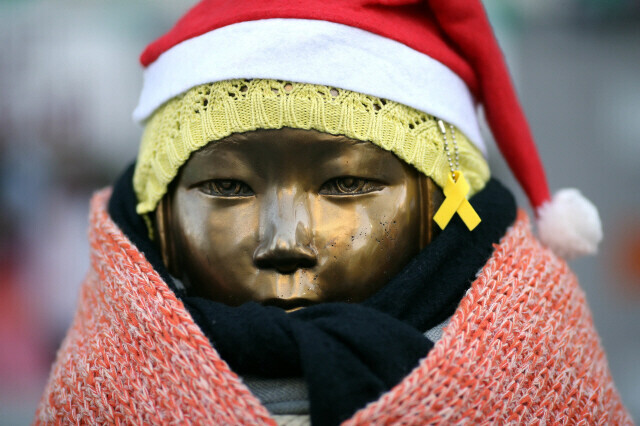hankyoreh
Links to other country sites 다른 나라 사이트 링크
Japan says it will not “submit” to Korean court ruling on comfort women compensation

The South Korean and Japanese governments released dueling statements last weekend over a South Korean court ruling on Jan. 8 that held the Japanese government responsible for paying compensation to survivors of wartime sexual slavery.
In a statement on Jan. 23, Japanese Foreign Minister Toshimitsu Motegi maintained that “states are considered equal entities with sovereignty according to international law, and they do not submit to another country’s jurisdiction as a rule.”
“Based on this principle of sovereign immunity, we cannot submit to South Korean jurisdiction. This ruling is extremely dismaying and unacceptable as a patent violation of international law and the agreement between Japan and South Korea,” he continued.
“I once again strongly insist that South Korea produce appropriate measures,” he added. The ruling in question was finalized on Jan. 24 after the Japanese government abandoned an appeal — a gesture meant to repudiate South Korea’s jurisdiction on the matter in the wake of the first verdict. Its position was that it did not intend to comply with the ruling, and that it was up to the South Korean government to take “appropriate measures.”
The same afternoon, the South Korean government fired back with its own statement. The Ministry of Foreign Affairs (MOFA) said it respected the agreement reached on the “comfort women” issue in late 2015 and did not intend to “make any additional requests of Japan at the government level,” but added that Japanese needed to “make sincere efforts to restore the victims’ honor and dignity and heal their wounds based on a keen perception of responsibility and a spirit of apology and remorse” as stated in that agreement.
It also insisted that Tokyo “needs to face that this [sexual slavery issue] is a matter of the globally unprecedented infringement of women’s rights during wartime and violations of universal human rights, and that it was in violation of international law in addition to international human rights norms.”
As with the Supreme Court ruling on victims of forced labor, the situation is turning into a war of words between South Korea, which has been emphasizing the importance of efforts from both sides to resolve the issue, and Japan, which has pointed to its 1965 agreement with South Korea in an attempt to place all responsibility for a resolution on Seoul. But with the elderly sexual slavery survivors reportedly planning to merely demand a “sincere apology” from Japan without pursuing compulsory execution measures against Japanese government assets, observers are saying the situation is unlike to escalate into the same sort of calamity for South Korea-Japan relations as the previous Supreme Court ruling.
By Gil Yun-hyung, staff reporter
Please direct comments or questions to [english@hani.co.kr]

Editorial・opinion
![[Column] Has Korea, too, crossed the Rubicon on China? [Column] Has Korea, too, crossed the Rubicon on China?](https://flexible.img.hani.co.kr/flexible/normal/500/300/imgdb/original/2024/0419/9317135153409185.jpg) [Column] Has Korea, too, crossed the Rubicon on China?
[Column] Has Korea, too, crossed the Rubicon on China?![[Correspondent’s column] In Japan’s alliance with US, echoes of its past alliances with UK [Correspondent’s column] In Japan’s alliance with US, echoes of its past alliances with UK](https://flexible.img.hani.co.kr/flexible/normal/500/300/imgdb/original/2024/0419/2317135166563519.jpg) [Correspondent’s column] In Japan’s alliance with US, echoes of its past alliances with UK
[Correspondent’s column] In Japan’s alliance with US, echoes of its past alliances with UK- [Editorial] Does Yoon think the Korean public is wrong?
- [Editorial] As it bolsters its alliance with US, Japan must be accountable for past
- [Guest essay] Amending the Constitution is Yoon’s key to leaving office in public’s good graces
- [Editorial] 10 years on, lessons of Sewol tragedy must never be forgotten
- [Column] A death blow to Korea’s prosecutor politics
- [Correspondent’s column] The US and the end of Japanese pacifism
- [Guest essay] How Korea turned its trainee doctors into monsters
- [Guest essay] As someone who helped forge Seoul-Moscow ties, their status today troubles me
Most viewed articles
- 1[Column] The clock is ticking for Korea’s first lady
- 2Samsung barricades office as unionized workers strike for better conditions
- 3[Correspondent’s column] In Japan’s alliance with US, echoes of its past alliances with UK
- 4After 2 months of delayed, denied medical care, Koreans worry worst may be yet to come
- 5[Column] Has Korea, too, crossed the Rubicon on China?
- 6Hong Se-hwa, voice for tolerance whose memoir of exile touched a chord, dies at 76
- 7US overtakes China as Korea’s top export market, prompting trade sanction jitters
- 8All eyes on Xiaomi after it pulls off EV that Apple couldn’t
- 9[Photo] Smile ambassador, you’re on camera
- 10[News analysis] After elections, prosecutorial reform will likely make legislative agenda